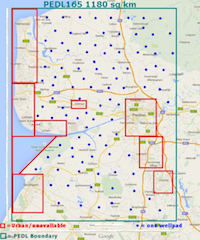Things that make you go “Oooh!”
Are the fault lines in fracking starting to show?
A very interesting comment by DavidKSmythe appeared on an Observer article about the fracking industry– this weekend. So interesting that we thought we should reproduce it for you here.
We have edited out a comment on the ethical practices of the BGS which remains in the original comment as we can’t verify it independently.
The oil exploration industry has a whole sub-industry of subcontractors offering their specialist services. One of these fields is whether or not geological faults in any particular area will seal off a potential oil or gas reservoir, or will act as a conduit. Just google ‘fault seal analysis’ to see for yourself. The default industry position on fault seal risk (which means the risk of the oil or gas being trapped – the desired outcome) is that faults do NOT normally act as seals.
I have found no authoritative study of the UK that mentions the fault seal problem in connection with horizontal fracking (sometimes also referred to as slickwater or high-volume fracking, to distinguish it from other methods of fracking which can safely be used). A leaky fault is a fast-track back to shallow groundwater and to the surface for methane and other gases, as well as (perhaps) for the contamination of water resources by fracking chemicals. Juxtaposed against this, the question of earthquake triggering is but a sideshow. In the south of France (where I live), fracking has been banned partly because of this risk, which was pointed out two years ago by geologists from the University of Montpellier. In NW Germany, a thorough study has been carried out by “neutral” academic experts (but funded by ExxonMobil), which includes the question of fracking through faulted zones. I have not yet digested this long report, which is in German; but one of the main conclusions is that faulted zones must be avoided. In England, by comparison – nothing. Instead, we have Professor Richard Davies of Durham University, who uncritically quotes results from the USA (published incidentally, with sparse details, by geologists working for a Halliburton subsidiary) which imply that leakage via faults to the surface of fracking fluids and gases is not a problem. The Royal Society report of last year did not even discuss the question, even though it was submitted in evidence to the Society by the Geological Society of London..
The USA work (even if it is to be believed) cannot be applied to Europe, because in the old continent the geology is extremely different. The English shale basins, for example, are 10-100 times smaller in area that the main US basins, but the shale deposits are 10 times thicker. Faulting is almost non-existent in the US basins, whereas it is a fundamental and important feature of the basins of the north of England, the Weald, the south of France, and NW Germany – all areas which are or have been considered for fracking. I have not yet looked at Poland.
Faults cannot necessarily be ‘seen’ in advance of drilling, for example using geophysical methods, and indeed it is common for exploration wells to drill through a fault zone without it even being spotted. For example, the Preese Hall earthquakes, triggered by Cuadrilla test fracking near Blackpool two years ago, cannot be matched to the location of any known faults.
So before this new ‘dash for gas’ in the UK, and certainly before any further fracking is undertaken, we need a thorough study in each area which quantifies the risk of faults being the potential source of leakage back to shallow levels. Why has this not been done? There are half a dozen academic groups in the UK which could undertake this kind of research. But first, two words of warning. Firstly, in the case of Nirex, a government agency which tried to justify the siting of a nuclear waste repository at Sellafield in the 1990s, there is no question that their detailed computer predictions were manipulated to yield a favourable outcome. In the computer modelling, values for the fault properties were inserted which had the result of effectively airbrushing out the faults. Second, can the British Geological Survey be asked to do this work? No, because firstly I don’t think it has the in-house expertise, and in addition [edited out]
I am preparing a paper for peer-reviewed academic publication, which will examine this question of faulting in some detail.
It would appear though that the bland reassurances we have been receiving from people at the BGS like Professor Stephenson about the risks of both seismic activity and fracking fluid communication with the aquifer should be questioned rather more than they have been.
Who would have thought it?
































